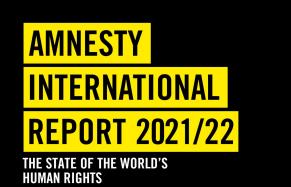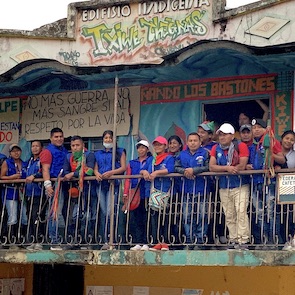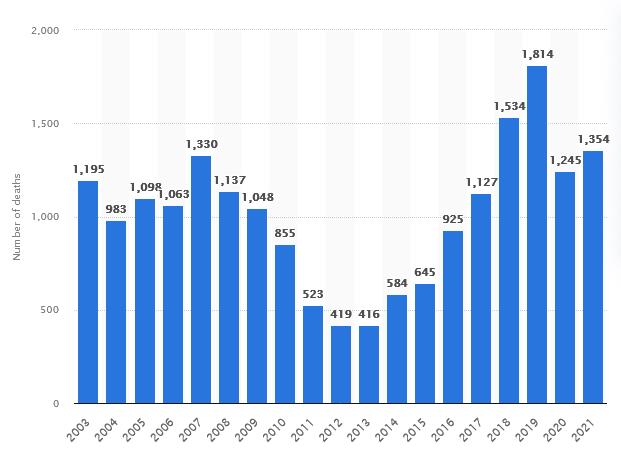This month, we update you on developments in Colombia, Brazil, Peru, Argentina, and Venezuela.
The UN Rapporteur for Human Rights Defenders has denounced the killing of indigenous human rights defenders in Colombia. It is believed the killings were carried out by a non-state actor, believed to be a dissident FARC. Meanwhile, Amnesty International has published its 2021 Annual Report on Colombia, analyzing the slow implementation of the peace process and the situation of indigenous, gender, and LGBT+ rights, attacks on human rights defenders.
In Brazil, the number of civilians killed because of police intervention in Rio de Janeiro has more than quadrupled between 2013 and 2019. Amnesty International has submitted a report to Brazil’s Universal Periodic Review, which will take place in November. According to Amnesty International’s latest Annual Report, Peru has recorded the world’s highest number of COVID-19 per million people.
In Argentina, health professional Miranda Ruiz, who guaranteed access to legal abortion in the city of Tartagal in Argentina’s province of Salta, is being investigated by the criminal prosecutor despite abortion being legalized a year ago. During the 49th session of the Human Rights Council, Amnesty International expressed its concern regarding the human rights situation in Venezuela.

You can now access and download the Amnesty International Annual report 2021/2022.
Find out more.
COLOMBIA

The UN rapporteur for human rights defenders has denounced the killings of indigenous Nasa human rights defenders by a non-State actor, believed to be dissident FARC. This follows the killing of four Nasa indigenous Guardians by the same non-State armed group in the last week of January. “It is extremely worrying and shocking that children are direct victims of these attacks.” Non-State armed groups continue to recruit children, abducting a 14-year-old Nasa boy.
Spain’s leading newspaper El País reports that the Colombian government’s claim to have ‘neutralised’, i.e. killed, 11 members of dissident FARC in a town near the border with Ecuador has been contested by locals and the Defender of the People. They claim that these were mainly local civilian leaders and their families. This raises the spectre of a return to ‘false positives’, when the army killed innocent civilians and then claimed they were armed guerrillas.
Peace Brigades International explores recent investigations by the transitional justice system (JEP), set up under the Peace Accords, into human rights abuses against environmental rights defenders in Magdelena Medio region. Local communities have long opposed extractive industries which have damaged the environment and provided them with no monetary benefits.
Amnesty International’s 2021 Annual Report on Colombia analyses: the slow implementation of the Peace process; the military’s profiling of 57 journalists as part of its campaign ‘truth in a sea of lies’ and the attacks on 402 press workers; excessive use of force by the police; arbitrary detention and torture; the situation of indigenous, gender and LGBT+ rights; attacks on human rights defenders; forced displacement and confinement of 100,000 people in the year; impunity; and refugee and migrants’ rights.
BRAZIL

Statista reports: ‘The number of civilians killed as a result of police intervention in the state of Rio de Janeiro has more than quadrupled between 2013 and 2019. In the latter year, more than 1,800 people were killed in circumstances related to police operations in the state of Rio de Janeiro, up from 1,500 deaths a year earlier. In 2021, more than 1,350 deaths by state agents were reported.’
Amnesty International submitted a report to Brazil’s Universal Periodic Review, which will take place in November. In it, Amnesty International evaluates the implementation of recommendations made to Brazil in its previous UPR, including in relation to preventing and combating torture, promoting racial equality, ensuring Indigenous peoples´ rights, reforming public security, and ending extrajudicial killings. It also assesses criminal justice reform and human rights policies and programs aimed at the protection of groups at risk
Amazon Watch warns of the consequences of the fast processing of new ‘destructive’ mining bill opening the Amazon to commercial exploitation. They estimate it could lead to a loss of 160,000 km2 of forests and $5 billion in annual losses in ecosystem services. ‘It removes any opportunity for Indigenous people to veto activities on their lands. If approved, the bill will lead to an increase in deforestation, invasions of Indigenous lands, and violence against these peoples.’
Amnesty International’s 2021 Annual Report on Brazil analyses: the situation of economic and social rights; freedom of expression; excessive use of force by the security services including the killing of over 6,400 people by the police; impunity; killing of human rights and environmental rights defenders; right to a healthy environment; indigenous, Afro-descendant and peasant community rights; and LGBT+ and women’s rights.
PERU
According to Amnesty’s latest Annual Report, Peru has recorded the world’s highest number of Covid-19 deaths per million people. Concerns remain about impunity for excessive use of force by law enforcement officials. In 2021, formal criminal charges were brought in cases of forced sterilisation. Proceedings in other cases of systematic sexual violence resumed. The authorities have yet to address adequately the health crisis experienced by Indigenous peoples due to environmental contamination by toxic substances. Cases of gender-based violence increased in 2021, as did the number of missing women.
UN human rights experts have expressed dismay at the Peru Constitutional Court’s decision to restore a presidential pardon and to release former president Alberto Fujimori, saying it represents an unacceptable regression in the country’s fight against impunity for gross human rights violations committed during his administration. On March 30, the Inter-American Court of Human Rights ruled that Peru should not release Fujimori despite the order of the Constitutional Court. According to the court, this measure seeks to guarantee the right of access to justice for the victims of two massacres in 1991 and 1992, for which Fujimori has been sentenced to 25 years in prison.
ARGENTINA

Miranda Ruiz, a health professional who guaranteed access to legal abortion in the city of Tartagal in Argentina’s province of Salta. Miranda is being investigated by the criminal prosecutor of that city for the crime of causing an abortion without consent.
The criminalization of healthcare providers who guarantee access to legal abortions prevents doctors from providing basic care. An Urgent Action targeting the Criminal Prosecutor of the Judicial District of Tartagal was launched to withdraw the criminal procedure against Dr. Miranda Ruiz as guaranteeing access to abortion under the law is not a crime. The Urgent Action is now closed, and further updates will soon follow. Thank you to all of those who took part. More information on this case can be found here.
VENEZUELA
Amnesty International, during the 49th session of the Human Rights Council, issued two oral statements on the human rights crisis in Venezuela. The first one, related to the Interactive Dialogue from Fact-Finding Mission, mentioned that international efforts on accountability for grave crimes in Venezuela remain critical. Read the statement here. The second one linked to the High Commissioner for Human Rights related to Protection and inclusion of human rights defenders remains critical to addressing the human rights crisis, read the full statement here
Amnesty International annual report 2022 on Americas; Venezuela: Indigenous people, extractivism and migration by human rights violations.
Related to Venezuela, Amnesty International has highlighted that the racism and discrimination remained widespread throughout the region, where insufficient access to water, sanitation, health services and social benefits compounded the impact of the pandemic, particularly on indigenous peoples. Venezuela continued to allow the development of major extractive, agricultural, and infrastructure projects without obtaining the free, prior, and informed consent of the affected indigenous peoples, and sometimes despite court orders to suspend operations. Also, throughout the year, tens of thousands of people—mostly from Venezuela—fled human rights violations related to violence, inequality, and climate change.
All the best,
South America Team – Richard Crosfield (Colombia and Brazil), Carla Torres (Chile and Argentina), Javier Martinez (Venezuela) and Graham Minter (rest of South America). And please don’t forget that you can follow us on our Facebook page and Twitter.